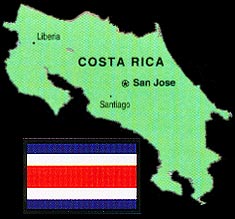 "We have some problems sometimes because we have a very open view of
sexuality," says Dino Starcevic. He is one of fifty ILPES (Latin American Institute for Prevention and
Education in Health) employees responsible for educating teenagers about AIDS
prevention in high schools, where there is frequent resistance by the religion teachers.
ILPES was formed in 1992, and became the first AIDS-prevention organization to receive
major funding from the Dutch government. Since the late 1980s the Dutch government has made the funding
of AIDS prevention programs a priority in Latin America, Asia, and Africa, where local
governments have not made the AIDS epidemic a priority for economic, as well as
cultural, reasons. Another source of funding comes from a private Dutch organizatoin called HIVOS
(Humanist Institute for Cooperation and Developing Countries). "We work on prevention and empowering
minority groups. We work from the holistic model based on the theories of Carl Simonton," says Starcevic.
ILPES provides workshops of all kinds, and their main outreach now focuses on women.
"We have some problems sometimes because we have a very open view of
sexuality," says Dino Starcevic. He is one of fifty ILPES (Latin American Institute for Prevention and
Education in Health) employees responsible for educating teenagers about AIDS
prevention in high schools, where there is frequent resistance by the religion teachers.
ILPES was formed in 1992, and became the first AIDS-prevention organization to receive
major funding from the Dutch government. Since the late 1980s the Dutch government has made the funding
of AIDS prevention programs a priority in Latin America, Asia, and Africa, where local
governments have not made the AIDS epidemic a priority for economic, as well as
cultural, reasons. Another source of funding comes from a private Dutch organizatoin called HIVOS
(Humanist Institute for Cooperation and Developing Countries). "We work on prevention and empowering
minority groups. We work from the holistic model based on the theories of Carl Simonton," says Starcevic.
ILPES provides workshops of all kinds, and their main outreach now focuses on women.
There still is a stigma attached to AIDS, but it's getting better. "If you go to the official clinics you can still read 'Avoid gay friends in order not to get AIDS,' " says Starcevic. In the beginning of the epidemic, in southern Costa Rica, when a hemophiliac patient died of AIDS the townspeople burned down his house. If a family member was infected, the family would immediately place the patient in a shelter. (It is noteworthy that Costa Rican laws prohibit any person or group to incite hatred toward another person or group.
Today, there is greater understanding and a better attitude says Herrera. Neighbors will take food to the patient, or help out with caring for the patient's children. There are groups and organizations available. The Department of AIDS Control has a team that visits the family's home and educates them in a supportive way to deal with a family member who has AIDS as a chronic sickness and not a death sentence. Starcevic differs somewhat with Herrera. "We think this is necessary because people are still very much afraid of AIDS. And they reject and discriminate against some people who have AIDS and we want to change this idea. And the people who have AIDS, we want to change the idea that they are going to die soon. They can have a good life even if they have AIDS."
Another organization that is also a recipient of HIVOS is Triangulo Rosa, or The Pink Triangle, which was launched in 1991 by fifteen activists, including Francisco Madrigal, who remains the vibrant leader of the organization today. The organization supports and advocates human rights for gays and lesbians, as well as AIDS prevention. A hotline provides AIDS information, and counseling services are available. In addition, their workshops cover psychological and legal support. Since several organizations are sponsored by the same source, each organization has its own function so as not to duplicate services. "ILPES works more in prevention, we also do, but not that much. We work with gays, lesbians, bisexuals, and HIV [populations], [focusing] more on empowerment," explains Karla Barahona, one of six paid employees of Triangulo Rosa.
The International AIDS Awareness Day takes place on December 1st each year in Central Park in the capital of San José. Last year, for the first time, main provinces held their own activities for AIDS awareness. It is a time to celebrate, thanks in huge part to Murillo and his compatriots, who paved the way for other AIDS patients. Murillo, who is healthy and still on protease inhibitors, leads a political support group called the Association of Patients Living with HIV and AIDS, which focuses on discrimination, empowerment, and finding employment for their members. Currently, the group has seventy clients and they just opened an office in May (prior to that they were using Murillo's home). Says a spirited Murillo, "I feel very proud of my work but I'm certain that, due to circumstances, it was my turn to take up the cause. I am only the face, and not the body, of those who are in the struggle."